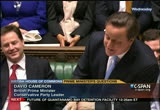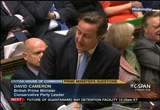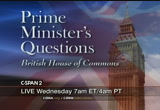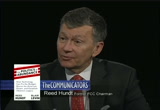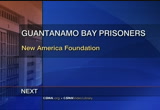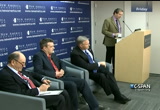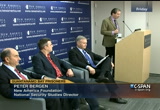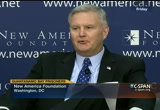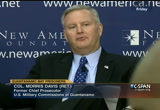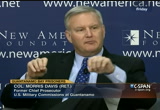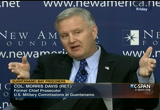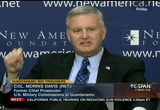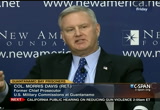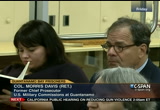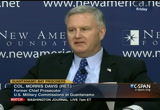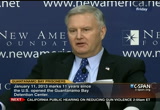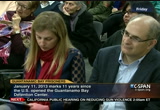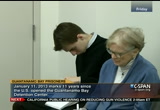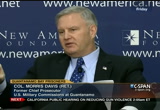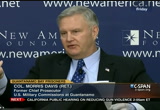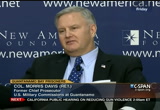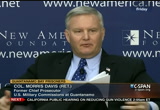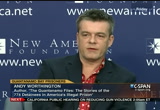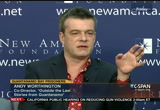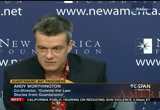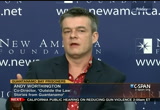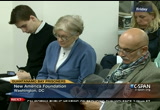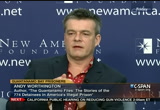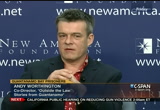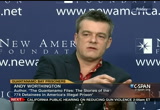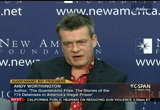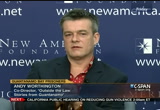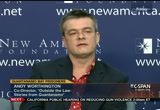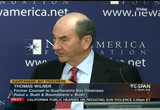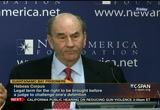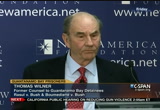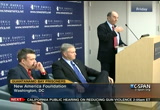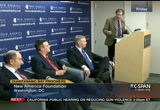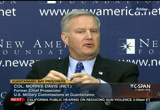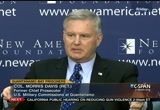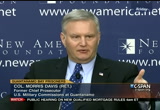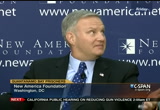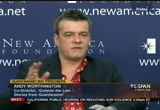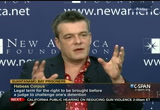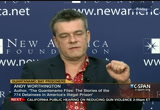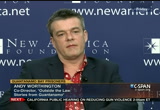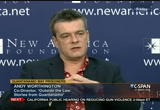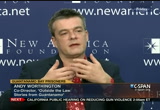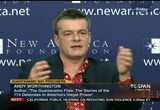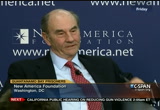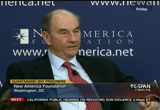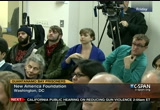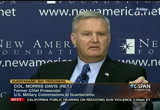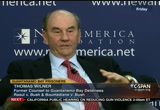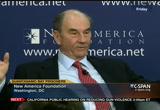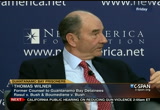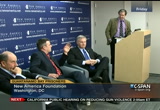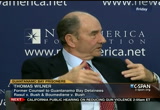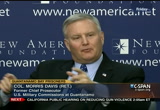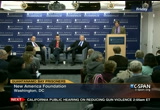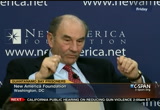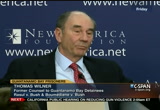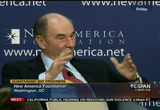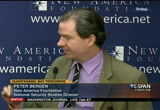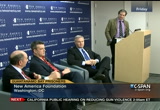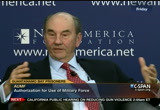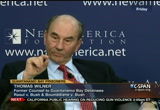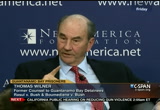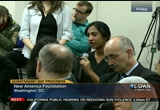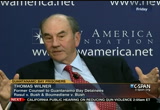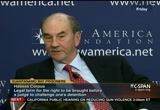tv Guantanamo Bay Detention Center CSPAN January 14, 2013 12:30am-2:00am EST
12:30 am
friend that i am closer to all conservatives than i am to anyone from any other party. >> yesterday, the secretary of state for health received a report recommending the downgrading of maternity services and the closure of the a and e department at lewisham hospital. does the prime minister recall the coalition promise to end the forced closures of a and e and maternity services? if this is not to be on the list of broken promises, will he ensure that these closures do not go ahead? >> what the government and i specifically promised was that there should be no closures or reorganizations unless they had support from the gp commissioners, unless there was proper public and patient engagement and unless there was an evidence base. let me be absolutely clear -- unlike under the last government when these closures
12:31 am
and changes were imposed in a top-down way, if they do not meet those criteria, they will not happen. >> the prime minister will remember that this house gave the green light to stem cell research some years ago, but we now find that the eu court of justice is hindering progress by bringing into question the validity of the patents protecting research. on behalf of the millions of people in this country who suffer from long-term medical conditions, will the prime minister do what he can to clear this blockage? >> my honorable friend makes an extremely serious point. i will look closely at it, because i think this country has a competitive advantage from our having taken difficult decisions about stem cell research. it is important that we continue to lead in that area -- not only, as my honorable friend says, for economic and scientific reasons, but because we want to make sure that for people with long-term and debilitating conditions, for children with disabilities and other concerns, we crack those problems for the future.
12:32 am
without that level of research, i do not believe that we shall. i will look very carefully at what my honorable friend has said and i will write to him with an answer. >> is the prime minister proud of the growth of food banks across this country, including in my constituency? has he visited one, and if not, will he do so? >> i am proud of the fact that 1 million more people are in work in this country than there were when this government came to office, that we have made sure that the lowest paid are not paying income tax and that we have protected the poorest families. i am proud of all those things. unlike the honorable gentleman, i do not look down at, or talk down to, people who work hard in our communities to help people. >> order. >> you have been watching prime minister's questions from the british house of commons. question time airs live every wednesday at 7:00 a.m. eastern when the house of commons is in session and again on sunday nights at 9:00 p.m. eastern and pacific on c-span. you can watch anytime at c- span.org.
12:33 am
>> next, a discussion on the future of the blunt, obey detention facility. after that, mike thompson holds a public meeting on ways to reduce gun violence. the consumer financial pup -- protection bureau public hearing on new rules for qualifying home mortgages. >> the fundamental idea here is if you spent time in silicon valley, detroit, where the automobile industry is being rebuilt, did you spend time outside the beltway, you feel that america has the potential to generate abundance for its own citizens and the world. if you spend time only inside the beltway, it looks like a zero sum game, it looks like luz-lose, and who is going to lose the most is the gist of the
12:34 am
negotiation. what we tried to say was, what are the lessons of the technology sector? what are lessons from the optimism in the technology sector? >> it was interesting, the other day, bill clinton was out there and he was saying, we cannot expect our businesses to compete internationally if they have only access to workers of korea. he is absolutely correct. >> reed hundt and blair levin talk about technology's role in repositioning the u.s. as a leader. that is at 8:00 eastern on monday on c-span2. now guantanamo bay opponents criticize president obama over current law on the transfer of detainees from the detention center. analysts at the new america foundation describe the situation in which dozens of prisoners have been clear for
12:35 am
release but cannot be moved. the facility has been open for 11 years. this is an hour-and-a-half. >> mining is peter bergen. and the director of national security studies. the opening ofg guantanamo. we have an exceptionally well- informed panel to talk about that. we have pretty much the same group, exactly the same group, speaking in this room a year ago. i asked and the worthington, people have been released since a year ago, and the answer is four. there are still 166 detainees at guantanamo. the question that this panel,
12:36 am
the big question is, is the obama administration moving towards a policy of indefinite detention? have they already moved towards that? first up to speak will be colonel mo davis, warns davis, who was the chief prosecutor in the guantanamo bay military commissions. he now teaches at a law school. he had a distinguished career in the u.s. military. to his right is anti worthington. -- andy worthington. he went to new college oxford. we have known each other for a long time. he has been at the forefront of investigating who was at guantanamo. this was question that was not well answered initially. the detainees did not have lawyers, and he wrote a book published in 2007 that really laid out in a public sense who
12:37 am
was at the prison and what their stories were. he is also co-director of a film about the guantanamo detainees, and we are happy to have him. he was traveling to the u.k. to mark the anniversary, the 11th anniversary. to his right is thomas wilmer. he established the right of how is corpus for the prisoners at guantanamo, an incredibly important case. he continues to be involved in representing detainees. we'll start with colonel amodei this. -- mo davis. >> thank you. i would start out by saying, it is a pleasure to see you, but i hate to start that way by lying. i have seen a number of you for years. i keep hoping that we will meet here one day on january 11 to
12:38 am
take a historical look back at a footnote, regrettable footnote, in our nation's history, rather than an ongoing chapter in our nation's history. i do appreciate you coming out again this year. it seems a groundhog day. we just keep coming back here and replaying this same story over and over again. not much happens in between. i would like to say thanks to peter and the new america foundation for having us. andy, for organizing these things every year and staying focused on this issue, -- when a lot of other people find it convenient to focus on the kardashians. tom, for his years of working diligently to try to right this wrong. the speaker mentioned, -- as
12:39 am
peter mentioned, it gives me optimism to see young people who are fired up, they will graduate and a lot to change the world. when i was their age, thinking that my generation would change the world -- a drop in the post- vietnam, a post-watergate era. i knew my generation was going to be different and we were going to make a difference and make the world better, and here we are. it gives me hope, seeing this new generation coming up behind me with the same sense of optimism and determination to make a difference. it is easy to be pessimistic too, because as i look at them, it occurred to me that we have raised a generation that has only known a post-9/11 world. what it has become is the new normal. i have tried to explain to them that 20 years ago, somebody was
12:40 am
feeling you're growing at the airport, that was called a sexual assault. it has become an everyday practice of life, things we just accept now. you have seen how it has changed public perception. during the buss administration -- bush and administration, polls showed that most americans were opposed to torture. now, a majority of americans are ok with torture. you have to stop and ask yourself, what has happened? why has this become the picture of america? i am somewhat optimistic that this will be dealt with in the second term of the obama administration, perhaps there is some room for optimism and the national security front. i think there are a lot of different pieces that make up this puzzle that portrays a bad picture of america, and guantanamo is one piece of that puzzle. there is a question of indefinite detention, military
12:41 am
commissions, the drum programs, which are programs with an s. terrace a military program and a set -- and the cia program. secrecy, persecution of whistle- blowers, war was wiretapping -- they are all pieces in this puzzle that in my view, as we sit in 2013, sitting together to present a bad picture of america. i'm hopeful that in the second term, the administration will put the pieces apart and clean them up and put them back together to -- to create a better picture. the important piece of that is guantanamo. my concern with guantanamo -- it makes a nice bumper sticker, close at guantanamo, but closing guantanamo creates undue guantanamo summer also was to address the underlying issue of indefinite detention.
12:42 am
i think tom and others will talk in more detail, but on the 10th anniversary, but there was a lot of media and press coverage about the 10th anniversary of guantanamo. you go on google news today, i do not see it on there unless you look for it. there's an op-ed in new york times -- the writer is now saying, eh, keep guantanamo open. it is interesting overtime watching this process evolves. it is frustrating to see that the public could largely care less about it. they think closing one, -- closing guantanamo is the right step to take, but we have to address the underlying issue of how we got to guantanamo and in the first place. we've had this big debate about
12:43 am
the fiscal cliff. how about a debate about guantanamo? in an article, it was sad we spent $390 million a year operating the facility in guantanamo. there are 166 detainee's at guantanamo. that is almost $850,000 per person, per year at guantanamo. maximum security confinement at a prison in u.s. averages about $30,000 each year. we're spending about 27 or 28 times more per person, per year to keep people in guantanamo and maintain this blight and our reputation than it would cost to maintain them in the u.s. if you consider that a majority of these 166 people at guantanamo are people that have been cleared for transfer, that the cia and department of justice and the fbi have looked at and concluded we are not to
12:44 am
prosecute them, we do not have evidence, and we do not believe they present a significant risk to us, and we do not want to keep them -- they have been sitting in your after year at guantanamo because of their citizenship. because we do not trust the yemen government to be responsible. part of the justification for the drone program is that we have the consent of the many government to conduct the operation. they're not trustworthy when it comes to taking detainee's. it seems we're a bit hypocritical in our views of yemen. as i said, i think guantanamo remains a stain on our reputation. recently, congress passed a bill that prohibits granting visas to members of the russian government that refused to human rights the violations. president obama signed it.
12:45 am
in retaliation, the russian government passed a bill that prohibits americans from adopting russian children, and president clinton, before signing it at a news conference, was quite angry about the bill that our government passed. he said -- who is the u.s. to condemn us about human rights when they have at guantanamo? it remains a blight on our reputation and one that we waste and offer -- an awful lot of money and credibility to keep open. it seems 11 years into it, it has become moribund, by god, we said we were going to do it and we're going to do it, whether it makes sense for naught. we have people on the other side of the city that determined that guantanamo would stay open. you might say that congress has a 9% approval rating. in addition to saying 9% of the
12:46 am
american public approves of congress, it also asks people to look at, which do have a more favorable opinion of, congress or a number of choices -- congress ranked behind root canal and head lice. but ahead of gonorrhea and the kardashians. [laughter] president obama -- president bush signed the order authorizing detention of detainees -- this has been going on for about 11 years. we have concluded a grand total of six and half at trial in 11 years. -- of trials in 11 years. i say half because one man was supposed to galt -- swiss post a corporate with the government,
12:47 am
-- was supposed to cooperate with the government -- it has failed time and time again. we recently had the d.c. circuit -- effectively drove a stake through the decision from the supreme court, and the unanimous decision said that material support for terrorism is not a legitimate u --rnational lawfi lawfull offense. he did not actually get convicted. we only have five and half convictions over our 11 years of effort. if you follow the ec decision,
12:48 am
there's another case. the department of defense, mark martin's, who is the fifth chief prosecutor, the department of defense concluded a material support and conspiracy are not legitimate international lawful offenses, and they declined to participate in the appeal and it dropped the conspiracy charge against collegiate mohamed and other 9/11 detainees. the department of justice decided to move forward on the appeal ruling that those are a legitimate offenses, that the government has two different opinions. general martins to the podcast is today, and he said, number one, there's another option award to prosecute these guys, which is true because congress said cannot bring them to the u.s., so you cannot prosecute
12:49 am
them in federal courts. we created the obstacle that makes military commissions. we created our own justification. he said it is the best form and a small number of cases, but if you peel that back and look at why, is because of the no rights advisement and the basic treatment in detention. if you peel it back, it is about what we did then -- we did to them, which makes military commissions seem like an attractive option. he said, you cannot have trained police out in the middle of an armed conflict, picking people up and doing right to advisement. that is true, and it is great advisement. -- a great argument. i would concede that point. the should prosecute in the military commission every person that was on the field during an armed conflict.
12:50 am
all these detainees were arrested by pakistani authorities in pakistan. another was arrested in thailand by police. another detainee arrested in dubai, and yet another arrested in somalia. this notion that we have to have this special forum because of the battlefield conditions is a great smokescreen for this second rate process that says more about us than it does about the people we're trying to bring before us. another important piece is the issue of torture. the senate select committee on intelligence recently concluded completed their report, and you probably saw john mccain and dianne feinstein say that the report concludes that torture did not work. it is a stain on our reputation. it is important that that report be released to the public,
12:51 am
particularly after the premiere of "zero dark thirty," which reports to be -- which purports to be a factual account of capturing osama bin laden. that movie will become the public's perception of reality, and it is a lie. i think that movie makes it doubly important for the senate select committee's report to be declassified so the public and at least have a debate that is based on the truth and not this hollywood life. it is ironic -- to this day, a man is set to go to prison for killing a man who was elected to be involved in torture -- talking about torture will get you sent to prison. committing torture makes you a hero. jose rodriguez and all these
12:52 am
people who have written books, and they are heroes in the eyes of folks who believe that artworks, and they are walking free, and we're sending somebody to prison for their words and nobody has gone to prison for their actions. i think the drone program is another area where it is a mistake to talk about a program -- we have a military program and governed by the loss of four. you hear people talking about -- the laws of war. you hear talk about the rules and distinctions that regulate the armed forces, and by following those roles, military personnel have combated unit -- immunity. you killed during combat, it is not murder. you have a community as a combatant. collateral damage is a corollary of that. if you drop a bomb and it kills the bad guy and some guys around them, as long as you applied the principles of laws of war, then
12:53 am
those deaths are collateral damage. the cia has a drone program, and that is a civilian agency with civilian contractors that are not part of the military. the laws of war do not apply. they do not have competitive community. collateral damage does not apply absent combative community. i'm not sure where we get the authority to send civilians around the world to commit what i believe is murder. we finally have the catalyst in which -- the kill list -- when president obama campaign in 2008, he talked about a bush had got rid of our values, but i do not recall that president bush had to kill list determining when an american needs to die
12:54 am
without trial. i'm hopeful that these will get reexamined in a second term. president obama met the plane carrying ambassador stephen spotty at andrews air force base -- he talked about the sacrifices made, and he said, we will not be deterred, and that america will always shine as a light into the world. i think what we have done in the last 10 years, we have been a warning light, not biting light. i'm hoping in the second term, we can turn that around and live up to the values that we purport to represent. [applause] >> heck hello, everybody. -- hello, everybody. i wish we were here to be marking the closure of guantanamo. four years ago, when president obama came to office, he issued
12:55 am
an executive order promising to close, within a year. that was absolutely the right thing to do. since then, the prisoners at guantanamo have been felled by the obama administration, by the ned states congress, by the majority of the mainstream media, and by the mainstream american public. when you look at what that means for the people in guantanamo that these failures have taken place, the most important fact that we need to be aware of on this day is that half of the prisoners, over half of the prisoners, had been cleared for release by a sober and responsible group government officials and lawyers. in their report that was issued three years ago, these were decisions that were made. in some cases almost four years ago, these are not people who are needed to be held because
12:56 am
they pose a security risk or because they have ongoing intelligence value to the u.s., and yet they have not been released. the u.s. went from a very high level process -- in about half of these cases, these men were previously cleared for release by military review boards but the bush administration. in some of the cases, and you may not know this, these men were cleared as long ago as 2004, and yet they continue to be held. some were cleared in 2006. some by 2007. in september, one of the men was first told in 2004 that he would be released -- he died at guantanamo. it was nearly six years after he
12:57 am
was officially told that he should be leaving the prison, and he was still there. he was one of the yemeni prisoners. the united states government has decided that the ayman prisoners are terrorist threats. the point i want to make to everybody watching this is, think about what it means to be the government of the united states and clear people are released from guantanamo and not release them. compare that to some dreadful totalitarian regime that puts people in prison and throws away the key and says, that is the end of it. you will rot here. that is not honest. saying that we have our review process, but then we're not going to release you.
12:58 am
that is more cruel than the dictatorship. until those men are released, that will be the situation. this apparently is not a great source of shame to many people. i do not understand why that is. if we were honestly saying that we would indefinitely detained these guys, and that is the and the story, it would be a different story. we would be attacking this from a different point of view. we're struggling to mobilize people to be outraged about this. we know that one of the stumbling blocks in this is congress. it is absolutely clear that congress has been a major stumbling block in the president being able to do this. congress has imposed onerous restrictions -- that is how one of the officials described it -- on the release of prisoners. refusing to allow prisoners to a
12:59 am
country that they deem as dangerous. refusing to allow prisoners to be released to a country where any single prisoner has been accused of recidivism. unsubstantiated reports continued to emerge, claiming that a significant number of prisoners could return to the battlefield -- the new america foundation has done a lot of research to debunk those claims. one in four or one in five prisoners and returned to the battlefield and are actively engaged in terrorism. that is a wild exaggeration. it is black propaganda produced by people whose intention is to keep guantanamo open, people who not only like the fact that guantanamo is a place of indefinite
1:00 am
there are many people with power and responsibility in this country that would like to add you people to this population. they like the idea of holding people without any accountability for the rest of their lives. it is a terrible situation we are in but if we are to believe that the president of united states was somehow powerless, i think we're underestimating the role of the commander in chief. there are ways in which president obama can at least argue with congress. we have not had an argument on the necessities for closing guantanamo. it continues to be damaging. it is so deeply insulting to the values that americans hold. we need to persuade president obama that is not enough for him not to be revisiting his promise and trying to fulfill it. it has proved to be politically difficult. it is his second term. the wisdom in the united states is that you don't let anybody
1:01 am
have less than -- more than two terms. he runs all kinds of problems in the u.k. would you let members of parliament have more than two terms. president obama has an eye on his legacy now. he has an eye on his momentum and knows that what happens in the second term will decide how he is viewed by history. all these people and important positions on what the history books to record that they were good people. bush, cheney, and rumsfeld said terrible things happened and they took a robust approach. with the help of people like kathryn bigelow, it is easy to rewrite the rules aren't torture as they got john hughes to do. president obama knows that he
1:02 am
will be judged on what happens over the next four years and i really don't think fundamentally that he wants to be known as the man who promised to close guantanamo and then did not do because it was politically inconvenient. that is clearly what the history books will say. there are people within the administration who know that this indefinite detention program is more a legacy of the bush administration than something they constructed themselves. this does not say that the administration's hands are clean. this is administration that has preferred to kill people by drones rather than deal with domestic problems that the bush administration created. it is becoming something he completely owns now. in whatever way we can, we need to reach out to be an ministration and say this is a difficult issue but it is not
1:03 am
something we cannot all deal with. we have to, first of all, be saying in whatever way we can, in our conversations with their friends and family and people we meet and whatever way we can campaign to keep saying that this is not a position the united states can be and.-- in. 11 years after the dreadful experiment of torture and indefinite detention, we are still in a position -- in a worse position where all three branches of the u.s. government is holding people we said we wanted to release. we are holding men we wanted to release eight years ago, six years ago, five years ago, three years ago. we have to release these people.
1:04 am
one issue is the yemenis and the problem that because the ones who tried to block a bomb in his underwear -- from that moment on, there was a ban on releasing the cleared yemenis. as though all yemenis are terrorists. you clear somebody on the one hand and then said he is still a threat. make your mind up. these are not significant people. it is too easy as a result of saying we cannot release them to ramp up the significance. we have had this exaggeration before. these are not significant people in any manner. otherwise, they would never have been cleared for release. we need to focus on that issue, not on the hysteria but on the fact that we said these men could go home but now we say they can't because you are from yemen. it is a horrible message to be sending out and it is completely unjust for these men.
1:05 am
the other issue is that there are certain prisoners mostly from countries where it is not safe for them to be returned because their government would treat them at least as badly as the united states has. there are still a few prisoners in guantanamo who are moslems from a province in china. there are serious, there chileans in guantanamo. i don't understand where they are still held because they were opposed to their dictator who has been deposed. that is one issue i think needs to be looked at as to why specific people are still there and the one that many of us have been campaigning on for many years who is the last british resident in guantanamo. united states government has
1:06 am
clearly said they want to release him. he is on a list of 65 prisoners. it was the first time the united states publicly said these people should be released and he is on the list. from the british government, we have the statements over the years that they want him back to be reunited with his british wife and four british children and yet he is still being held. those of us studding this case think it is because he knows too much. he is a very eloquent man has always fought for the rights of prisoners and knows the dark stories of guantanamo and the presence in afghanistan. he would be an embarrassment to both governments if he is released. unfortunately, he is part of the situation where we have reached the point where -- he is a good example of how neither
1:07 am
government wants action because it will be embarrassing. they want to delay it because nobody cares enough. it is the reason the present obama has been able to shirk his responsibilities. people don't care enough. is it at all acceptable that you clear people for release and then don't release them? if we can push on that one and make that perhaps our biggest message that we need to say to the administration and congress, then maybe we meet again in a year's time, we will have had some progress. thank you. [applause]
1:08 am
>> i am going to stand up and talk here because it makes me feel taller and i can see more people. i had no idea of what was going to say when i came here but i have been inspired by moe and andy. we come again and nothing happens. i am -- i realize this is an opportunity because guantanamo is off the map. it used to be the day when we first took this on where we could do interviews with people and they would listen to us and now you cannot get a story in the newspaper about guantanamo. this is an opportunity to talk about it again. i see cspan is here so let me say something -- this will be what you all said -- that maybe putting it to my own context -- i think it should be clear to everyone, not only people in this room but people around the country, that guantanamo is wrong.
1:09 am
it started out wrong and is an excuse to escape the law. it was an offensive contract that you could escape law by keeping people in guantanamo. the government still argues that for most rights except the right to habeas corpus, that is embedded -- that has been gutted by the d.c. circuit, probably the most conservative circuit in the country. their interpretation of what habeas corpus means will allow nazi germany to hold people in concentration camps. guantanamo is fundamentally wrong. of the 100 cities -- of the one of the 66 people held there, half of them have been cleared. we are holding people we should not hold. that is crazy.
1:10 am
we say we should hold them because it is politically inconvenient to let them go? it is just wrong, absolutely wrong. guantanamo is. over christmas, i was away and i happened to be at a dinner and a young girl was there, her 13th birthday, her mother introduced us and said tom was the lead lawyer in the guantanamo case before the supreme court and she said, what is guantanamo? she did not know what guantanamo was and i was hurt that she did not know who i was. [laughter] it is more important that it had become the new normal. she said guantanamo was not something on her radar screen. she knew about gun violence. she knew about trafficking of women. she knew about other issues. she even knew some things about the fiscal cliff and the economy but she did not know about guantanamo.
1:11 am
it had disappeared. i'm not going to say anything more relevant. guantanamo continues to hurt us around the world. i asked peter if it is an issue in the middle east. does it include people the way people about the united states? sure, it is. it is still a reason that people become extremists. it is just not us. we want to fight trafficking. that is not u.s. policy. this is u.s. policy. this defines who we are.
1:12 am
it is a stain on our reputation. i want to finish with what andy said. i don't know people here watch the movie," lincoln." it is the story of how abraham lincoln pushed through an amendment to the constitution to free the slaves. when you look at it, that was not something -- there were a lot of other issues that he could have avoided that issue to bring the state's back together for economic reasons, to stop killing, and the war, lots of other issues and people said what is this issue matter to you? it was a moral issue defining what the country would be. there are lots of inconveniences' whether it be yemen or other things to closing guantanamo. there are political inconveniences' these are things that can be done, that can be worked out if the president has a commitment to close guantanamo.
1:13 am
there has been nobody defined in the white house four years ago to close guantanamo. i look at cspan and mr. president, this is your legacy. if you don't close it, it will be on your historic watch that was not close. you have to take charge of this and get this place closed. that is it. [applause] >> thank you all for your very, very persuasive and interesting presentations. before we open it up to questions, i want to ask you some questions.
1:14 am
i want to begin on a personal note because, in a sense, this has been very much a part of your lives. starting with colonel davis and event andy and then tom, you were the chief military prosecutor -- why have you moved to the position you now have? andy, how did you get involved in this issue given that you were the journalists doing many other things before this? tom wilner, your a managing partner at one of the leading law firms in washington for this was by no means a popular cause with your fellow partners. that is my intuition. why did you get into it and if you could give us a sense of the timing -- >> my first involvement was back in 2005 when i became the chief prosecutor.
1:15 am
i can into the job that summer believing what i think most of the public did -- i was told by my government that these men were the worst of the worst, the kind of people that would chew for the hydraulic planes flying to guantanamo just to kill americans and i believed that then i got there and began to look at some of these cases. khalid sheikh mohammed and some of the others at guantanamo really are the worst of the worst. for every one of those, there was some factor of others -- 779 people have been detained in guantanamo and wants to get rid of 87 now -- if you look at the ones the government intends to prosecute, it is about 30 people's total. it is less than 5%. during my tenure, i felt the
1:16 am
government was really committed to having a fair process in the military commission. the country has this romanticize the notion of nuremberg. i think nuremberg was a significant accomplishment in its time the time has marched on and law has progressed. i would hope that what we did at guantanamo that our grandkids would look back as having been an achievement and not a detriment. towards the end of my tenure, there was had some new officials, places above me in the chain of command that my policy and that i had people over may and the president says we don't torture and who are you to say we do.
1:17 am
we need to get these guys convicted and get these -- get the show on the road. i believe very strongly in our country and constitution and our principles and values. when president obama accepted the nobel peace prize said it is doing the right thing not when it is easy but when it is hard that makes us who we claim we are. for the last 10-11 years, we have not been the land of the free and the home of the brave we have been the constraints and the cowardly because we have been living in fear in electing the government's run roughshod over us. they are taking our liberty to give us some security and we will tolerate what ever. when i joined the military, my commitment was i wanted to defend the country and maintain our values and principles. i think the state we have been in for the last -- in the post- 9/11 era -- is contrary to what america is all about what made
1:18 am
us different is our belief in law. we chose guantanamo because we thought it was outside law and created processes in order to avoid blthe law. i have gotten fired from jobs and ostracized and it certainly is not a career path i recommend to my law students. [laughter] at the end of the day, you have to believe in something and you have to be willing to stand up for it. the public, i think, is largely out on these issues and i will try to make it as uncomfortable as i can by continuing to remind them. i appreciate opportunities like this and i appreciate people interested enough to come out on a dreary friday and listen and i hope you'll talk to your friends and neighbors and maybe we can reverse course on what we have done the last 11 years.
1:19 am
[applause] >> like many foreigners, i was very disturbed on january 11, 2002 when donald rumsfeld gave permission for photographs taken by soldier of the men in armies jumpsuits the kneeling in the hot caribbean sun with shackles. it did not look like any recognizable form of detention that was internationally acceptable. i realize the color orange was more familiar to americans. i did not know that at the beginning. around the world, that sent out a debt very damaging message. the conservative "daily mail" in england called a torture from the beginning.
1:20 am
we then realized as time went on that a small amount of information came out of this place. it was totally closed. the administration could and did everything they wanted. the prisoners had no rights whatsoever. stories starts to come out and british prisoners in particular released spoke very eloquently as to what happened with them and i got more interested. i began full-time working on this seven years ago. what motivated me really was parlay that it was the united states that had such a common place in the world and was fairly openly declaring to the world the existence of this present but did not want to know anything about how it worked in who was held there. what they're doing was so
1:21 am
fundamentally wrong, that needed to come out and i have not changed my mind about that and i never will. if you're going to deprive people of their liberties and you're going to claim that your a civilized society, there are only a few ways you can do that. you accuse someone of being a criminal, arrests of them, and within as short a time as possible, you put them on trial at and that they're guilty, they are sentenced to prison. the only other week and deprive people is if you capture the military context and give them protection of the geneva convention until the end of hostility. neither of those happened. these men were literally held without rights for 2.5 years until the supreme court said these men have to have the right to do this. between the seventh of february,
1:22 am
2002 and president bush claiming that the geneva convention did not apply until june, 2006 the supreme court said excuse me, and a prisoner you are holding has the minimum protection of article 3 of the geneva convention which guarantees that you cannot torture or abuse. between those two dates, the united states was happily toward free people because it claimed they did not have rights. the very fundamental issues that drew me into this and keep me involved. along the way, i happened to be in place and i have the ability to be there when a huge amount of information was released through the freedom of information act. there were the names and nationalities of the prisoners,
1:23 am
8000 pages of allegations and the transcripts of the tribunals and review boards that took place. they began this process of finding out who these prisoners were. they were starting to tell their stories. this is what i discovered in my research is that these guys were not the worst of the worst after analyzing where and when they were captured and what was going on, you realize most of them had been bought and nothing was known about them when they're brought to guantanamo i have come to realize that it gets worse the more research i do. they knew nothing about these people and had to build up a story and they did this weather through torture or whether to bribing prisoners, pushing people until they said i cannot think anymore. what do you want to hear?
1:24 am
i will tell you a story. the evidence against the prisoners is mostly statements that were made by their fellow prisoners in their in guantanamo or in some cases outside. most of these are allegations made by a small number of prisoners. when you subject it to an analysis, any kind of objective analysis, it falls apart. people are claiming that people were in places they could not have been. the whole thing is a house of cards built on false statements, in some cases it was by bribing prisoners. the whole thing is hollow and disgusting. that is why i got involved and that's what i am still here, trying to push these issues. everywhere you look at this
1:25 am
story, the kind of injustice that has taken place is horrible. it is not an indictment of the american people that this happen but it is an indictment of the american people that the crimes that are still going on continue to happen. this is the conscience of a nation. a small number of people -- it should not matter how people are treated individually but it is not just these individuals at guantanamo, it is the principles that are at stake here. we have been in a very troubled place for 11 years and this becomes the new normal. god forbid that in four years president obama has still done nothing about this -- that is such a profound stain on the american character. i hope you realize the implications. [applause]
1:26 am
>> i want to pay a compliment to moe. he really represents the very best of the military tradition in this country and want to say, since i have been involved in the guantanamo fight since the beginning, many of the people who stood up for the american principles were the military guys and they were overridden by the civilians. moe, standing for the principles of the united states, i have the utmost respect for you. from my own personal story, i am a little jewish kid whose grandfather came from russia in 1880 something. one does not know whether the stories of your family are true but we believed them.
1:27 am
my great-grandfather was a famous rabbi and in the 1870's, he read the declaration of independence and the gettysburg address and he said that there really is such a country, what my children growing up there. my grandfather and his three brothers came to the united states. my grandfather, more than any religion, my grandfather would recite the declaration of independence, the preamble, and the gettysburg address to his kids and we came to believe those things as the most important thing we believed then. we believe in justice and of the rule of laaw.-- law. our values are our greatest strength in the world, as ronald reagan said. i believe what moe and andy said that principals are not something you the paper. they matter when you are tested and you have to do it. i believe in saying that the worst places in hell are
1:28 am
reserved for those who stand silent in the face of injustice. [applause] >> i will open it up to questions, if you can identify yourself and ask a question and wait for the microphone. >> i am with free-speech radio news -- you spoke about the road blocks from congress. can anyone on the panel talk more about the specific ones that were just renewed or past and what impact that will have? >> this is becoming a new year's eve tradition. congress passes the national defense authorization act and it has included language that prohibits using any of the funds that were appropriated in that massive bill to bring anyone from guantanamo to the u.s. and also if anyone is being
1:29 am
transferred out of guantanamo, they have to get a certification to congress and notice of the reasons for the transfer. this is two years in a row that the president said he would veto the bill if it passed and on new year's eve, which would he dropped first? the ball in times square or the obama of the to request? some say he is a pragmatist but there is another key word to describe what he has done by not standing up and keeping his word and restoring our reputation. he says all the right things about the rule law and values and principles but he has failed to live up to his word.
1:30 am
congress has made it difficult. one of the same critics are the ones that say if anyone tried to interfere with the unilateral executive discretion, it was unconstitutional to infringe on that power. these those same people that are trying to handcuff president obama in exercising those same powers and making it difficult. i think it takes the president, as the commander in chief, using the bully pulpit. there is gun-control and other issues where he has stood up and taken the fight to the other side. he has not done that on these national security issues. he has let the other side carry the narrative. >> didn't he issue a signing statement meaning he reserves the right to ignore that particular provision of the act? >> correct, he was always very critical of president bush and president bush used to sign statements and now the president
1:31 am
is doing it to do with president bush did. he did sign the bill that says you cannot bring a detainee from guantanamo to the u.s. or transfer them to another country without solidify -- without notifying congress in advance. >> there are several problems with that issue -- most people in the country believe that guantanamo is military. in that context, there are a number of members of congress who play to that fear and hysteria by saying we will stand up and protect our constituents and we will not let them into the united states or anywhere else. you've got to oppose it by saying that they are wrong. you cannot just say i will negotiate a bill, you have to work earlier. and when you're fighting or the fiscal cliff and other things, the administration does not want to take it on and the democratic party does not want to take a month or even the republican party. the restrictions are in there
1:32 am
and it needs to be a long-term plan of how you stop them from being in there or how you work this out. >> the 86 people who have been cleared for release, perhaps there is more detail about who application for those releases? there was a task force. who else was involved in that process? >> after obama was elected, you have these people in guantanamo and people said they were bad but they did not know who they were. they did not have files on them. the files are scattered. obama administration said let's put together a task force and review them to see who these people are and we will release
1:33 am
the ones we can. the task force was put together and then it got screwed up because it took forever to put it up. included every agency. matt olson was the director. lisa monaco is the deputy assistant attorney general for counter-terrorism, was his deputy. they had representatives from every agency, from the cia, defense and intelligence agencies, the defense department. it was a very conservative agency. there had to be unanimous opinions to clear any one for release. all the agencies had to agree that this person is not a
1:34 am
current threat to the u.s. and is not of intelligence value. so it was extraordinarily careful, long process. many of the people who were cleared -- were not cleared, but they could not come to a unanimous agreement on them. these people should be released. >> given the fact that so many of these yemenis, there prison system in yemen, senior members of al qaeda have escaped not once but twice from their presence. is the fix simply a better yemeni prison? what is the fix that would make those people cleared for release, how would this work? >> there are about 30 yemeni prisoners that the u.s. government does not want to release. when those decisions were made by the task force, slightly less than 30, i believe, some of those were put forward for trial, recommended for trial. some were recommended for indefinite suspension without
1:35 am
charge or trial, because the government said they were too dangerous to police and did not have sufficient evidence to put them on trial. it is important we remain focused for now on the prisoners who were cleared. if officials approve these prisoners to transfer out of guantanamo, all that's required is the most minimal kind of supervision. it's not the suggestion they should go from one prison to another. it is that they should be released. primarily, because lawyers are involved. it is not just for reasons of security that they approved people for transferred rather than actually saying cleared for release. let them go free.
1:36 am
because the lawyers are saying don't ever underestimate responsibility for them, because then we will get sued. these people are not dangerous. i'm having to calibrate the dangerousness when you ask the question. a task force would not have approved them to go if we were not talking about such people. >> what is the stumbling block on the yemenis in particular? >> two. the fear is that yemen is unstable. it more political. if you release them -- moe is right. other than the 15 or 30 people who may be dangerous, everyone agrees these other people are nothing. even if they fought against us in afghanistan 12 years, they're nothing. they are really not dangerous people, these other people. olson says there basically nothing. so what is the stumbling block? the fear is that yemen is unstable, that one of these people could get out.
1:37 am
the republicans in congress will use this as political hay. some of these people could be released in the united states if congress or not saying, my god, they are dangerous, don't let them near our children. people have said that these are innocent people and congress will not even let uihgurs into united states. other countries don't want these prisoners. >> five years ago when there was more concern, and criticism had come through a global and domestically that something was deeply wrong and there was a lot of criticism, president bush was releasing prisoners. there were not the questions we have now.
1:38 am
it seems to be very deeply unsafe to release anyone, they say. the most massive case has been made for the release of anybody. cleared prisoners being held. it was almost easier for prisoners to be released five years ago. we're not talking about different people, fundamentally. around half of the cleared prisoners were cleared for release under president bush. many of them were yemenis. if your nationality is saudi, it became quite easy to get out of guantanamo because the united states has a much closer relationship with saudi arabia and negotiations were undertaken on that basis. but the yemenis have always suffered.
1:39 am
it is not acceptable that we can all agree there few dozen yemenis that everyone has said these appeared to be quite dangerous people so we have to be careful with them and hopefully we have most of them on trial. but they end up being treated the same and that's just wrong. we need to be able to make the case that people who are insignificant are just that. since president obama made his announcement to close guantanamo and then did not follow ups and has not taken the lead, we have had people filling the vacuum was mission is one of starting up fear, not because they generally believe in it, but for political motives. >> i was driving and i heard on npr and year-ago a story about somebody being in prison in cuba and it was unfair.
1:40 am
i thought it was coined to be a story about guantanamo and it was about alan gross, an american citizen in prison in cuba. our government is really good -- or the iranian-american that we were going to put on trial in iran or the hikers who picks up in north korea, they are really good about how dare you hold an american citizen and insisting that it's a violation of the rule of law and you cannot do this, yet we have people that have spent more than a decade in prison because of their citizenship, that we have said did not commit a crime, they're not there to be punished, they are here because of their citizenship.
1:41 am
i would imagine the public, the right-wing air bags that are on the radio and television would be pitching a fit if americans were being held because of their citizenship year after year after year in another country but yet we are supposed to be american exceptionalism. it apparently creates an exception when we do things that we condemn others for doing. it's fundamentally wrong. >> the gentleman here. can you wait for the microphone? >> i am eric lewis. i litigated the case on behalf of the british detainees, a supporter and religious abuse case. i would like to ask you about next year with the withdrawal of all troops and the end of combat operations in afghanistan, what is your view on the basis
1:42 am
under the law of war for continuing to hold without detention or trial those people were left at guantanamo? >> it is potentially an opportunity for congress to revisit the authorization for the force, which most congress people, when they voted probably did not think would last 12 or 13 years. is there any chance there might be a modified authorization once combat troops leave afghanistan? >> i think there is. the question is, there is no authorization to hold people. you really can arrest people for criminal charge or in a combat situation you could take troops and hold them until the end of the battle. the purpose is not punishment but to keep them out of the battle. but the battle is over.
1:43 am
i would think congress would have no right to even authorize their holding. that is going to be an argument. the argument for most of the people being held is that, that we're in a combat. the government will argue they were really picked up in the continuing war on terror. this is technical. i don't believe what authorizes detention authorizes continuing to hold people. at least that case was decided on an american citizen. picking somebody up in the context of a particular combat that is going on. it's confusing for people, but if the war is over you cannot hold people -- purported prisoners of war. >> the general counsel for the department of defense, who is leaving to go back into private practice, who is a person i have a lot of respect for, gave a talk in england at oxford recently where he did not go into great detail on this, but
1:44 am
suggested the same thing, that this war is winding down and when it does the legal justification reduced to detain these people likely goes away when the war winds down. >> would it not also take away legal justification for drone strikes outside war zones? >> that is another issue. >> what is the answer? i will let somebody else answer, because i tried last year as we did last year to try to keep the drones away from this issue. i am terribly troubled by it. i think there's a good argument you cannot do it. but what is not contingent on the other. i want to get guantanamo closed. >> we have two lawyers.
1:45 am
the authorization for the use of military force, is that the underlying legal rationale for the use of drones strikes in places like yemen? >> i think you have to keep in mind there are. people drawn are there's the military program and the "kill list" that goes with that program, yes, it is based on war. combatants can kill the enemy even if they are deemed unlawful as a combatant. i think it's much harder to make the argument on the field. >> i'm not asking if it's completely legally kosher in your own mind. i'm asking is that a legal basis under which the administration, whether it's bush or obama, authorizes the use of cia drone strikes? >> we don't know for sure, because they will not tell us. in the aclu lawsuit trying to get data legal justification, the government's argument is the
1:46 am
government has never officially acknowledged we have a drone program. >> it has given interviews now. >> but they say they have never officially -- they said the government has never officially acknowledged that we have a drone program. but the argument like in somalia and yemen and pakistan has been we have the consent of the government to hunt down bad guys and kill them for the benefits of us and them as well. so i don't know that the law of war is the legal rationale for those strikes. >> there's a distinction. i think the government can make a strong argument based on the commander in chief's power under the constitution. then he has the right to take action to protect the united states.
1:47 am
it is a slippery slope. that is independent of the opposition for the use of military force. the passage by congress of something authorizing make power stronger. justice jackson said when you have congress and the president to gather, to do it. i think they can argue under the constitution. one of the differences is the right to detain people is always something that has been covered aside from going and telling them -- the right to detain people has always been something more of the judicial branch and covered by judicial review. you may have more right to use force than you do to detain people in government. >> the constitutional authority is a great shield for a domestic criminal prosecution. but the constitution can create international law.
1:48 am
when they're killing people in yemen or pakistan, or somalia or other foreign countries, the constitution and whatever acts of congress have been passed are relevant. >> it brings to an end the principle that you can have these wartime detentions. people detained in wartime have not been detained as people detained in wartime should be detained. we have forged that completely, the geneva convention. the fact that people are supposed to be held until a certain time. >> combat troops. >> yes, but the problem is when the supreme court decisions were made, the judges echoed the
1:49 am
geneva convention by saying it also applied until the end of activities, setting up a parallel geneva convention. aumf will not be given up likely for people. this is some of the problems we have seen. it did not want to narrowly cover just the al qaeda and taliban but could be expanded for whoever the president decides is the enemy. it's troubling. we would be put in a position that we can argue we've reached the end. the last 11 years have shown there's a lot of institutional push for this war to be over with. >> the gentleman over here. >> i'm from the german embassy. my name is joseph. i have a question that may be
1:50 am
hypothetical. what would happen if president obama would decide tomorrow to close down guantanamo. he as commander-in-chief, if he would do this, what would happen? could congress or anyone block it? if you make this decision tomorrow, what would happen? >> well, there are practical problems now with where the people can go. so it takes work to get it so you can empty the people out of guantanamo. you really need to open it up so people can come to the united states, certain ones of them, and make it easier for them to go to a third country. i go back to lincoln. lincoln could not just say i'm
1:51 am
not going to allow slavery. he needed to work it through a democratic political process. it is difficult, but you've got to work it. you could not do it tomorrow. there are certain number of people cannot go back to syria or china. and others who cannot go anywhere. they may need to be in the united states for while. if there in the u.s. a while, we could effectively challenged detentions of those people being illegally detained. there are people from kuwait who could go home. so you need to work it, but you need to be committed to it and get them out of there. the fact is he has not done that. >> we have to define who those groups of people are. we have done some of that today. there's one state-less palestinians still at guantanamo. you cannot returned them, because you have to go through israel.
1:52 am
those negotiations never went anywhere. there are a handful of other palestinians than a been resettled in other countries. and one man was almost taken in by the german government in 2009. the germans want to take three, but they took two in the end. if they cannot go anywhere -- he cannot go anywhere until he's cleared. so there are the yemenis and the rest of the prisoners. some awaiting trial or those with indefinite detention. that's what we have to push when we are talking about closing the prison. >> if you look back at the memos that britain that gave president bush the authority, the justification to do what he did, as commander-in-chief, you have anything that will constrain exercise of authority is unconstitutional, so the president has limitless powers, basically.
1:53 am
if that was good advice back then, then i think the president as commander-in-chief could make a decision in that capacity. they say no money appropriated here may be used. that's the defense department. the president controls a lot of other executive-branch agencies that have budgets and the ability to arrange transportation. he would have to grow a big pair. >> if the obama administration signed an order to close guantanamo within a year, they would do a review process. they realized that in order to get third countries to take people from guantanamo, we have to take some. there was a plan to put a certain ethnic groups in northern virginia rather is already that ethnic group. these were totally innocent people.
1:54 am
a congressman found out about it and said you cannot take these guantanamo terrorists to my country. in fairness, obama announced the closing of guantanamo and dick cheney said it's a horrible idea, but these are the worst of the worst, a statement that was false. 40 of the people had been cleared by the bush administration. 40 more won habeas cases. peter dick cheney was lying or did not know the facts. the obama administration did not take them on, in any event. then they want to take that group into virginia, frank wolf said don't do that, and they backed down, the obama administration backed down. then congress said you cannot take them. what he's got to do is grow a pair of big ones, but he's got
1:55 am
to have a plan and these guys to work it. there are problems, but it's doable, and he has the power to do it. it will take a few months, but he could do it. >> there's no political value in doing it. >> it has to be moral. >> it's your legacy. >> the lady behind you. >> where am i going? >> sorry. i'm from the constitution project on the detainee treatment. colonel davis managed the dark times yesterday. i was wondering, there are a number of individuals who have been slated for indefinite detention. he just said if they were brought here, we could begin to argue against the indefinite detention, but there's also the argument emerging that if there
1:56 am
were to be brought here, it's a guantanamo or to be closed, they would likely be held in federal super max prisons, where the conditions would be much worse than at guantanamo. your thoughts? >> if i could jump in, you mentioned the word "likely." so this is not confirmed that they would be held at a super max prison. what she has done with that damaging op ed is she has made it look that there's no argument to be had about what might happen if we were to proceed that prisoners need to be brought here, to begin the process of genuinely closing guantanamo and that it would have more rights if they were brought here. why does she not say we could argue about that, that negotiations would be able to take place about the conditions demand would be held in.
1:57 am
why would they be held in super max presence if they have never been tried or convicted of anything? there's no direct correlation between the people in guantanamo and anybody held in any prison system in the united states? it would have to be negotiated. >> it's important. first, the guantanamo is a super max present it. i've been down there several times. people who say conditions are good there, they are terrible. let me tell you why they are terrible. not only are they in super max conditions, but they are in a place where they are isolated and they cannot see their families. in the supermax prison in chicago or somewhere else, families get to visit. they have not seen their families 11 years. they are allowed a phone call once a month or they can call back home.
1:58 am
if they were in the united states, there would get to see. their see there is another significant fact. the reason i say you can challenge in here, while they're in guantanamo -- and i probably should not say this publicly -- guantanamo was within the jurisdiction of the d.c. circuit, the reason they cannot challenge their detention if the d.c. circuit has adopted a rule which says if you lose a habeas case, if the government has any evidence against you that credible, that is an absurd rule. if there were someone else, there would be in a different circuits and you could challenge their detention. the indefinite detention is not legal under u.s. law. there needs to be a basis for it. if there's no basis for it, other circuits might accept it. the other thing -- let me say the other thing, three years ago when the obama administration said let's take these people, i spoke with the
1:59 am
administration and i said we don't want these people to be in super man conditions. they said we will agree to hold them consistent with the geneva convention. so it's all negotiable. people assume the worst. i think the reason all lot of people assume they should not come to the united states is because some lawyers benefit from guantanamo being open because it gives them employment and notoriety. human-rights organizations saying it will support indefinite detention to the u.s., that is wrong thinking. >> the gentleman over here. >> i am with washington research and analysis. research and analysis.
132 Views
1 Favorite
IN COLLECTIONS
CSPAN Television Archive
Television Archive  Television Archive News Search Service
Television Archive News Search Service 
Uploaded by TV Archive on

 Live Music Archive
Live Music Archive Librivox Free Audio
Librivox Free Audio Metropolitan Museum
Metropolitan Museum Cleveland Museum of Art
Cleveland Museum of Art Internet Arcade
Internet Arcade Console Living Room
Console Living Room Books to Borrow
Books to Borrow Open Library
Open Library TV News
TV News Understanding 9/11
Understanding 9/11